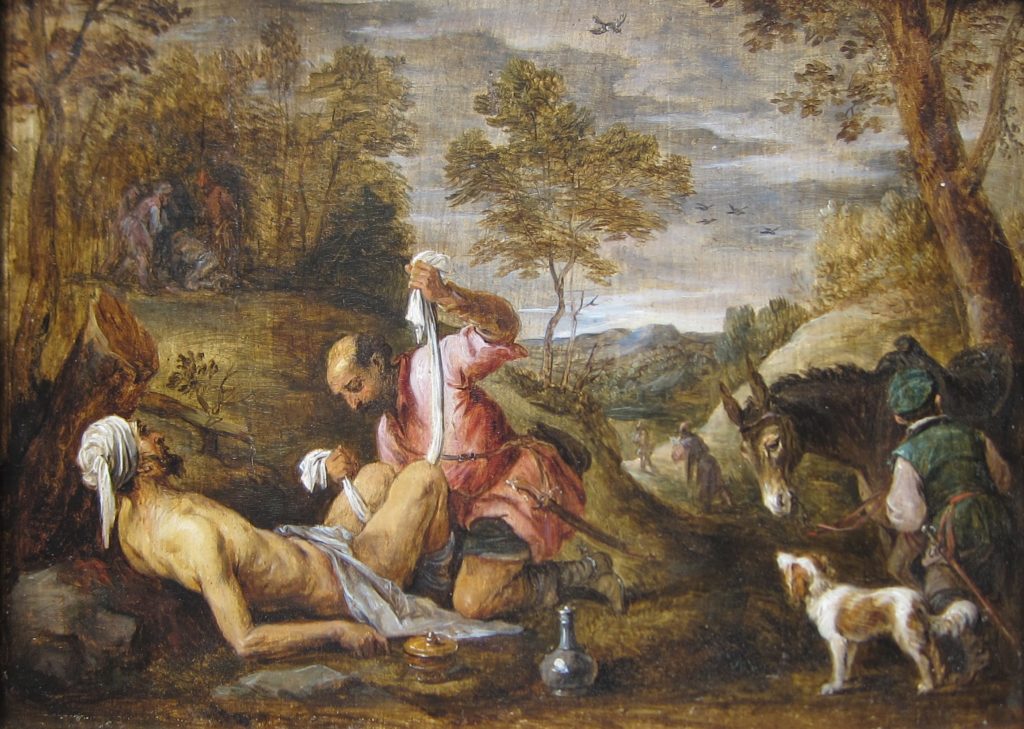Living in God’s Mercy
Luke 10:25-37
Fifth Sunday after Pentecost
Analysis by Brad Haugen
25 Just then a lawyer stood up to test Jesus. “Teacher,” he said, “what must I do to inherit eternal life?” 26 He said to him, “What is written in the law? What do you read there?” 27 He answered, “You shall love the Lord your God with all your heart, and with all your soul, and with all your strength, and with all your mind; and your neighbor as yourself.” 28 And he said to him, “You have given the right answer; do this, and you will live.”
29 But wanting to justify himself, he asked Jesus, “And who is my neighbor?” 30 Jesus replied, “A man was going down from Jerusalem to Jericho, and fell into the hands of robbers, who stripped him, beat him, and went away, leaving him half dead. 31 Now by chance a priest was going down that road; and when he saw him, he passed by on the other side. 32 So likewise a Levite, when he came to the place and saw him, passed by on the other side. 33 But a Samaritan while traveling came near him; and when he saw him, he was moved with pity. 34 He went to him and bandaged his wounds, having poured oil and wine on them. Then he put him on his own animal, brought him to an inn, and took care of him. 35 The next day he took out two denarii, gave them to the innkeeper, and said, ‘Take care of him; and when I come back, I will repay you whatever more you spend.’ 36 Which of these three, do you think, was a neighbor to the man who fell into the hands of the robbers?” 37 He said, “The one who showed him mercy.” Jesus said to him, “Go and do likewise.”
DIAGNOSIS: Dying to Justify Ourselves
Step 1: Initial Diagnosis (External Problem): Testing Ourselves against Others
Life is a test, we tell ourselves. We measure our progress. We gauge our level of success or failure. We test other people’s opinion of us against our opinion of ourselves to determine how well we are doing.
Notice that the lawyer who tests Jesus at the beginning of Luke 10:25-37 doesn’t ask him about eternal life in general, but rather, “What must I (emphasis added) do to inherit eternal life?” (v. 25). We want others to confirm that we are already passing—or better, acing—the test of life so that we can earn eternal life. And, like the lawyer, we are not above soliciting Jesus’ opinion of how we are doing, testing his opinion against our own, in the hope that we will be in agreement, and he will give us a passing grade.
Step 2: Advanced Diagnosis (Internal Problem): Wanting to Justify Ourselves
Deep down, in our relationship with God and other people, we want to be right—even when we aren’t. We want to justify ourselves. “But wanting to justify himself, [the lawyer] asked Jesus, ‘And who is my neighbor?’” (v. 29). The lawyer wants the law to bend in his favor. As far as he is concerned, it all hinges upon who his neighbor is. If he and Jesus can reach some kind of agreement over who his neighbor is, and determine that he is, in fact, already loving said neighbor, then the lawyer will have passed the test. Eternal life will be his inheritance.
The presumption of the lawyer is to test Jesus’ understanding of “loving one’s neighbor” against his own understanding. If the terms and conditions need revising in order to bend the law in his favor, then Jesus and he can see to that. In this scenario, the lawyer stands over and against the law rather than the law standing over and against the lawyer.
What the lawyer fails to realize, however, is that the purpose of the law is not to justify oneself. The purpose of the law is to love God and to love one’s neighbor. Wanting to justify oneself and loving one’s neighbor are actually mutually exclusive. When we use the law to prove that we are right, we lose sight of what the law is for. We cannot love people whose opinions we seek in order to justify ourselves. Rather than proving that we are right, our love has curved inward and turned selfish.
Step 3: Final Diagnosis (Eternal Problem): All the Way Dead
Nothing can prepare the lawyer for the story that Jesus tells him. Naturally, the man who was beat up and left half dead while traveling the road from Jerusalem to Jericho would have been considered a lost cause. That road was notorious for violent robberies. The man would be thought to have no sense. What was he doing traveling alone, or unarmed, for that matter? As a result of his foolishness, he had become one of many statistics documenting the fatal or near-fatal robberies along that dangerous stretch of road. Presumably, he had it coming to him, as many had before him.
What’s more, the priest and the Levite were believed to be justified in keeping their distance from the man who was beaten and bloody. The ritual purity prescribed by their law meant avoiding dead or nearly dead bodies, as well as bloody wounds. The half dead man couldn’t be their neighbor whom they were obligated to help; their law said, “No.” Likewise, the lawyer and we have our own laws to justify who our neighbor isn’t.
Jesus, however, doesn’t buy it. He doesn’t give us a pass by allowing us to justify who our neighbor isn’t. We can’t bend the law in our favor—not if Jesus has anything to say about it. His law, rather, shows us who we really are: people who would rather justify having enemies than loving our neighbors. As enemies of the people God loves—and has commanded us to love—we become God’s enemy. We lose our inheritance of eternal life. To God, we are not only “half dead”; we are all the way dead.
PROGNOSIS: Living for God and Our Neighbor
Step 4: Initial Prognosis (Eternal Solution): New Life for God’s Enemies
A supposed enemy, a Samaritan, loves and cares for the half dead man. Because the Samaritan doesn’t treat the man as you would an enemy, the man is healed and restored to life.
As already noted, God becomes our enemy when we want to justify having enemies rather than loving our neighbors. As God’s enemy, however, we are worse off than the half dead man. We are all the way dead. We are dead in our not wanting to love our neighbors.
However, what’s amazing is this: like the Samaritan, Jesus also treats his enemies as friends and neighbors. Jesus knows we could never be his neighbor or love others as he does. But rather than remain our enemy, God in Christ becomes our neighbor instead. He loves us as we could never love him, or other people, for that matter. The Samaritan’s love—which brought new life to his half dead neighbor—anticipates Jesus’ own suffering and death on the cross. Through Jesus’ cross, God gives new life to his enemies and makes them each other’s neighbor.
Step 5: Advanced Prognosis (Internal Solution): No Longer Wanting to Justify Ourselves—We Are Grateful for God’s Mercy
Like the half dead man rescued by the Samaritan, we are the dead whom God has brought back to life. We are eternally grateful to Christ who, by his cross and resurrection, has done what we could have never done ourselves.
The half dead man along the side of the road appeared to be a goner. But he lived because the Samaritan refused to be the man’s enemy. The injured man—now healed and resting in the hotel room provided by his unexpected neighbor—is glad he was wrong about the Samaritan.
We are also glad that we were wrong about God. We are glad that, in the end, God hasn’t been our enemy. God, in Christ, has rather laid down his life for us, his friends. “No one has greater love than this, to lay down one’s life for one’s friends” (John 15:13). This greatest of all loves transforms hatred toward our enemies into love toward God and our neighbors.
Step 6: Final Prognosis (External Solution): Doing Likewise—Wanting to Be a Neighbor
While the lawyer had asked Jesus the first question, “what must I do to inherit eternal life?” (v. 25), Jesus gets to ask the final question: “Which of these three, do you think, was a neighbor to the man who had fallen into the hands of the robbers?” (v. 36). “The one who showed him mercy” (v. 37), the lawyer replies.
Now Jesus gets to determine who our neighbor is. And we’re no longer looking to him so that we can justify ourselves, to tell us we’re right in our choice of enemies. Because God loves us fully as neighbors and friends, we are no longer justified in treating our neighbors like enemies. Rather, like the Samaritan, we want to show God’s love and mercy to others. We look for opportunities to show mercy to people as undeserving as we are.
As each other’s neighbor, we believe that we are all equally undeserving, though equally in need, of God’s mercy and love. And so, we strongly desire to heed our Lord’s command, “Go and do likewise” (v. 37). As a seminary professor of mine liked to say, we live by the creed that “God doesn’t need our good works; but our neighbor does.” We also rejoice in the ways that our neighbors show us the divine mercy as well.






You must be logged in to post a comment.